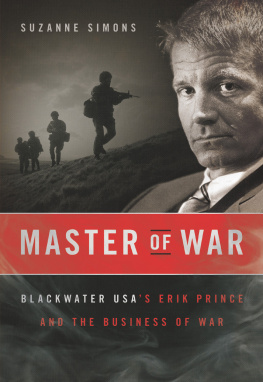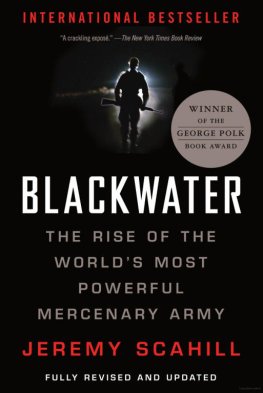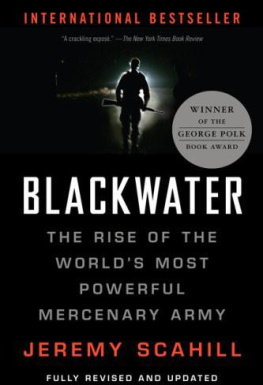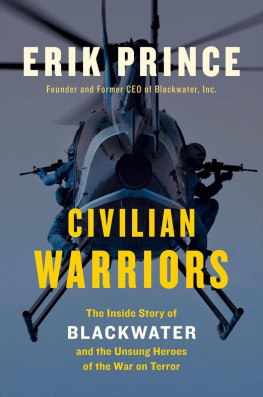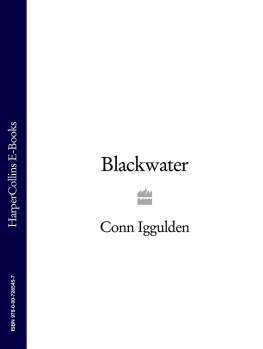E RIK P RINCES BODY bounced off the hood of the North Carolina Parks Department pickup truck before vanishing over a steep embankment next to a mountain road.
He had been going so fast that he couldnt control the bike, couldnt steer it out of the trucks path in time. Princes longtime friend Chris Burgess watched, horrified.
Prince and Burgess had signed up as a two-man, under-forty team for the annual Special Operations Adventure Race, an incredible test of endurance and physical strength. Participants spend anywhere from five to ten hours biking, paddling, rappelling, and running through the western mountains of Highlands, North Carolina. Prince and Burgess had gone through Navy SEALs training together several years earlier. Since then, Burgess had come to work for Prince as one of nearly a dozen vice presidents at Princes private military company, Blackwater. Prince ran Blackwater much like a military unit, and he and his top lieutenants all worked to maintain their physical conditioning. Prince often paired up with his men in tests of strength and endurance much like this North Carolina race.
The two had just finished rappelling down a mountain and had hopped on their bikes for a downhill sprint. Burgesswho was in front of Princesaw the pickup truck coming toward them first. He knew he was going too fast and tried to apply his brakes without losing control of his mountain bike. He made a lane switch at the last moment that took him out of the path of the oncoming truck. Prince did not. Burgess turned his head just in time to see Prince collide head-on with the truck.
All I saw is this flash of him going by, said Burgess. I thought, Oh, man, I just killed the boss.
Prince hit the front fender of the truck, slammed onto the hood, and then catapulted some twenty-five feet down an embankment. He just missed slamming into a tree before coming to a halt. He lay motionless on the ground that was covered with pine needles, leaves, and rocks.
Miraculously, he had avoided serious injury. He took a mental inventory of all of his parts. Everything was working, so I thought OK, great, get up, said Prince.
The two parks department employees had gotten out of their truck with a look of sheer horror on their faces. With Burgess, they stood in amazement as Prince climbed up the embankment and asked where his bike was. The Cannondale had been a present from his wife, the last gift she had given him before her death four years earlier. It was among Princes most-prized possessions.
The bike hadnt been as fortunate in the collision as Prince had been. It sat off to the side of the road, mangled and bent. Pumped full of adrenaline, Prince waved off concerns about his injuries and focused on the bike. Could it withstand the remaining six to seven hours of the race?
We spent about twenty minutes jumping up and down on the back fork of the bike, which was so bent, said Burgess. Finally, we were able to straighten it out, but it still had a one-inch wiggle.
With the effects of the adrenaline wearing off and the pain starting to set in, Prince hopped back on his bike, determined to finish the race. Every time his rear wheel turned, it dragged against the fork, eventually wearing a hole right through it. Yet Prince was not going to call it a day; he wasnt going to quit in front of Burgess. They made it to the finish, not as fast as some of the younger Special Ops contestants, but in impressive time for two guys pushing forty.
Princes entire life, and certainly his astonishing career at Blackwater, had been something of an adventure race. Sprint at top speed, crash occasionally, but never stop racing. Sometimes it meant cutting corners. Sometimes it meant leaving slower team members behind. Prince had relied on persistence and determination to grow Blackwater from little more than a training facility for military Special Operations and law enforcement personnel into a billion-dollar powerhouse, with the U.S. government as his largest client. The company had provided an ever-expanding list of services that included personal protection of U.S. diplomats in Iraq, security services at fixed locations for some of the CIAs most sensitive sites around the world, and airlift support for the Department of Defense in places like Afghanistan and Pakistan.
Blackwater designed and built its own weapons and aircraft, and purchased many, many more. It has a massive Rolodex of some forty thousand former military and law enforcement personnel at its beck and call. Prince built a private spy service. It operated in over a dozen countries. And it is all owned entirely by its founder, Erik Prince.
But Blackwaters breakneck growth brought with it a host of problems. The companys relentless determination to meet a growing demand for military services all over the world sometimes led to rules being broken.
While Prince likely would have preferred that his company remain a stealth operation, the images of his men being brutally murdered and dragged through the streets of Fallujah in 2004 made that impossible. Pictures of two of his employees dangling from a bridge spanning the Euphrates River was how much of the world was introduced to Blackwater. Four years later, in the fall of 2007, Blackwater men killed a host of Iraqi civilians in a Baghdad traffic circle. That is how the world got to know Prince himself, as the incident landed him before Congress and the media. It also touched off a slew of investigations and forced the U.S. government to take a closer look at how it managed private companies.
Beginning in 2003, after the invasion of Iraq, the rise of private military companies like Blackwater has been nothing less than meteoric. Private contractors now occupy the battlespace in Iraq on a one-to-one ratio with U.S. troops. They are often paid a lot more money by the taxpayer, and they arent governed by the same rules as U.S. troops. The stark lack of oversight and accountability of the industry has led to numerous congressional hearings and has put the policies of the Bush administration into question. Has the United States government farmed out too many critical parts of its own mission? Who will police this growing shadow army?
In the case of Blackwater, there are many more questions to add to these. How did the company win its big contracts? Whom does it employ, within the United States and abroad, through its various subsidiaries? Why were its men caught in Fallujah? What does Princes spy service do, and for whom?
The answers to all of these questions go back to one man: Erik Prince.
In just ten years, Prince had gone from small business owner to major Washington powerhouse. He had built his empire in part on his own personal wealthwhich is substantialderived from a windfall inheritance from his father. But he also built it through the aggressive pursuit of lucrative private-sector solutions for some of the worlds stickiest problems. He controled a private army that could single-handedly win many small wars. Is he a business genius? A war profiteer? The lucky recipient of a government shell game? What makes him tick?
Over the course of eighteen months, during which he granted more than one hundred hours of interviews and access to Blackwaters top offices and facilities around the world, he gave me the chance to find out.


